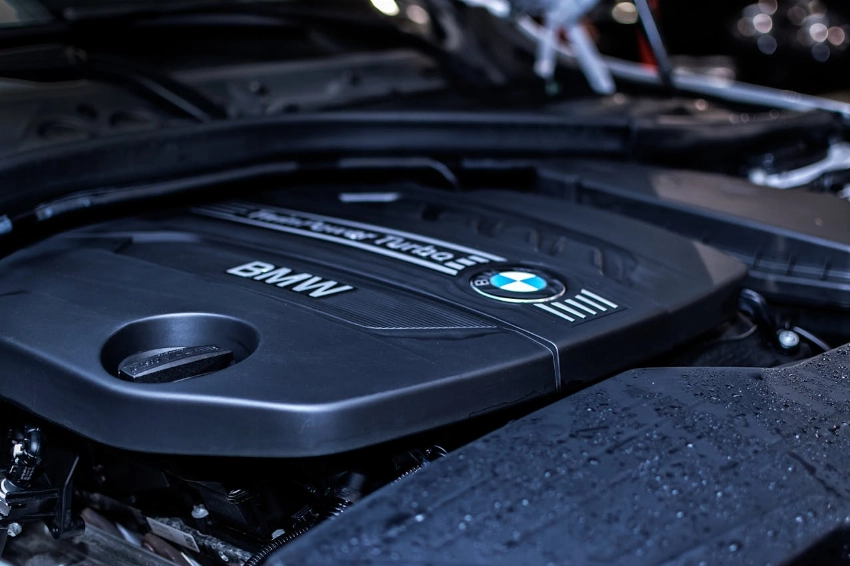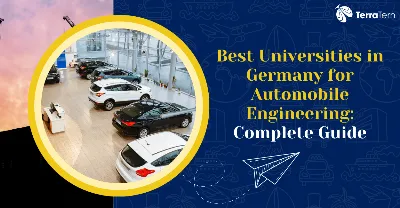Key Highlights
- Which Are the Best Public Universities in Germany for M.Tech in Automobile Engineering?
- What Are the Best Universities in Germany for MS in Automobile Engineering with English Programs?
- What Makes Germany the Top Destination for Automobile Engineering Studies?
- How Much Do the Best Universities in Germany Charge for Automobile Engineering Programs?
- What Are the Admission Requirements and Application Deadlines for 2025?
- What Career Opportunities Await Graduates of German Automotive Engineering Programs in 2025?
- How Do German Automotive Engineering Programs Compare Internationally?
- Conclusion
Seeking the best universities in Germany for automobile engineering, where you can pursue your studies in 2025. Powerhouse research in conjunction with lowBench industrial linkages renders German houses to the RWTH Aachen, Technical University of Munich (TUM), University of Stuttgart, and Karlsruhe Institute of Technology. University of Stuttgart and Karlsruhe Institute of Technology, with thanks to powerhouse research and close industry links. These are also the best universities in Germany for MS in automobile engineering and the best Public Universities in Germany for M.Tech in Automobile Engineering with state-of-the-art labs, internships, and QS-recognized strengths globally as EV, ADAS, and manufacturing excellence.
Which Are the Best Public Universities in Germany for M.Tech in Automobile Engineering?

Best Public Universities in Germany for M.Tech in Automobile Engineering include RWTH Aachen, the Technical University of Munich TUM, Karlsruhe Institute of Technology KIT, and the University of Stuttgart, which has a good number of its mobility technologies research and has a good industry linkage and ICT. These are also the best universities in Germany for MS in automobile engineering and the best universities in Germany for automobile engineering with low tuition and good specialisations in e-mobility and autonomous systems, and top-notch rankings worldwide.
|
University |
Program (Example) |
Language |
Fees/semester |
QS World ranking |
Winter Intake Deadline |
Specializations |
|
RWTH Aachen University |
M.Sc. Automotive Engineering; M.Sc. Automotive Engineering and Transport, and |
English (unique public, automotive-focused option) |
EUR300 contribution |
99 (2026) |
15 July |
E-mobility, autonomous systems, powertrain, lightweighting |
|
University of Munich (TUM) |
M.Sc. Automotive Engineering |
German (some English modules) |
Contribution to be determined (~EUR144) |
28 (2026) |
31 May |
E-mobility, driving intelligence, smart mobility. |
|
Karlsruhe Institute of Technology (KIT) |
M.Sc. Automotive Engineering |
English, German| |
EUR1,500 (non-EU)EUR170 |
116 (2026) |
31 May |
Hybrid/electric, vehicle safety, automated driving |
|
University of Stuttgart |
M.Sc. Automotive Engineering |
Predominantly German |
/EUR1,500 (non-EU) |
-- |
/15 May |
Powertrains, vehicle dynamics, safety |
What Makes RWTH Aachen University the Top Choice for Automotive Engineering?
RWTH Aachen University The best universities in Germany for automobile engineering. are
-
At a Glance: QS World Ranking 99 (2026); semester contribution: approximately EUR 300. Necessary deadline: July 15, winter deadline. Products: M.Sc. Automotive Engineering M.Sc. Automotive Engineering and Transport
-
Instruction: English option available; DAAD lists it as the only purely English-taught public master's specifically focused on automotive technology out of many public master's one named the "Automotive Engineering (MSc)".
-
Admissions Profile: Bachelor's degree in mechanical/automotive/electrical engineering; the English track typically requires IELTS/TOEFL. German tracks typically require TestDaF/DSH, as needed.
-
Unique Strengths: 100+ institutes + the industry-driven ecosystem; commonly reported as the best public choice for automotive in Germany and one of the leaders in Europe:
How Does Technical University of Munich Excel in Automotive Engineering
The Technical University of Munich is one of the best universities in Germany for automobile engineering
-
At a Glance, QS World Ranking 28 in the 2026 Semester, with a contribution of approximately EUR144. Deadline for the winter semester: 31 May M.Sc. Automotive Engineering interdisciplinary in depth
-
Instruction: Predominantly German, including some English modules (speaking to TUM's extensive engineering infrastructure and high employability through the local industry).
-
Admissions Snapshot: A Bachelor's degree in a relevant engineering discipline, with German language proficiency (e.g., TestDaF/DSH), is usually required. An English (IELTS/TOEFL) module could be required.
-
Unique Strengths: Specializations in the field of electromobility, autonomous driving, and sustainable mobility systems with good network connections with Bavaria's automotive cluster.
What Are the Strengths of Karlsruhe Institute of Technology for Automotive Studies?
The Strengths of Karlsruhe Institute of Technology are among the best universities in Germany for automobile engineering:
-
At a Glance QS World Ranking 116 (2026) Fees - EUR1,500/ semester /non-EU + ~ EUR170 contribution Winter deadline - May 31 M.Sc Automotive Engineering
-
Instruction: English and German: the "University of Excellence" stature and cross-disciplinary research culture of KIT are reflected in the teaching offer.
-
Admissions Snapshot Bachelor's degree in mechanical/automotive/electrical or related, English/German language proof according to track.
-
Unique Strengths: Research in the areas of hybrid/electric vehicles, automated driving, and safety in prominent vehicle systems institutes.
Why Choose University of Stuttgart for Automobile Engineering?
Here is why to choose University of Stuttgart for Automobile Engineering:
-
At a Glance: Fees EUR 1,500 / semester (non-EU). Winter application deadline: May 15. MSc Automotive Engineering: Strong applied project.
-
Instruction: Primarily a German Engineering environment in Stuttgart also supports vehicle dynamics and propulsion, and safety expertise.
-
Admission Snapshot: Bachelor's in the stream of mechanical/automotive/engine. German/language proficiency is a must for the main track. English tests for any English-taught modules
-
Unique Strengths: Dedicated to powertrain technologies and intelligent vehicle systems for nearby principal OEMs in the region.
Also Read: Best Public Universities in Germany You Must Know
What Are the Best Universities in Germany for MS in Automobile Engineering with English Programs?
Some of the best universities in Germany for automobile engineering with English-taught courses are led by RWTH Aachen University, which offers the only fully English-taught public masters program with an explicit automotive technology focus. Other prominent institutions consist of Esslingen University of Applied Sciences, Technical University of Munich (TUM), and Karlsruhe Institute of Technology (KIT), providing comprehensive course instruction options to the international students that aim to discover the best universities in Germany for MS in automobile engineering. These programs remove language barriers while maintaining direct industry connections and access to world-class research facilities in the academy, making the M.Tech in Automobile Engineering one of the best programs in public universities in Germany.
Which Universities Offer Fully English-Taught Programs?
RWTH Aachen University stands as the premier choice, offering the best universities in Germany for MS in automobile engineering .Sc. in Automotive Engineering and Transport as "the only English-taught programme of many public Master's" programs specifically focused on automotive technology in Germany's public university system. Esslingen University of Applied Sciences offers two English-taught programs in automotive studies. The Technical University of Munich (TUM) provides the M.Sc. in Automotive Engineering with sufficient English modules to complete the entire program in English.
|
University |
Program |
Duration |
Language |
Fees |
Key Features |
|
RWTH Aachen |
M.Sc. Automotive Engineering and Transport |
2 years |
Fully English |
€300/semester |
Only English public program, 40+ countries |
|
Esslingen UAS |
MEng Automotive Systems |
3 semesters |
English |
Standard fees |
Industry focus, practical applications |
|
TUM |
M.Sc. Automotive Engineering |
2 years |
English/German |
€6,000/semester (non-EU) |
Mixed language, flexibility options |
|
SRH University |
M.Eng. Engineering and Sustainable Technology Management |
4 semesters |
English/German |
Private fees |
Mobility focus, sustainability emphasis |
|
HECTOR School |
Master's in Mobility Systems Engineering and Management |
20 months |
English |
Part-time option |
Management integration, working professionals |
English Language Requirements for Admission
International students must demonstrate English proficiency by achieving a minimum score on standardised tests, as specified by the program in which they are enrolled. IELTS requirements usually vary from 6.0 to 7.0; most programs will require 6.5 and up. TOEFL iBT scores must fall between 80 and 100, with a score of 90 to 100 being the accepted standard range by most universities.
Alternative certifications in English include Cambridge English qualifications; Duolingo English Test (105-125 score range); and PTE Academic (59-75 points). Select Universities. Some universities offer alternative assessment methods for English-speaking countries or students with a degree from English-medium universities.
What Makes Germany the Top Destination for Automobile Engineering Studies?

Germany is the Top Destination for the best universities in Germany for automobile engineering, which are as follows:
-
The largest automobile market in Europe, containing the best automobile engineering facilities of the EU and a robust industrial base with an industry revenue of €536.1 536.1billion in 2024, 4.07 million vehicles manufactured, 773,000 people employed, and 22 percent of new-car registrations in the EU, Germany is an anchor to the best universities in Germany for automobile engineering.
-
The industry invested in 2023 in internal research and development (R&D) amounting to 30.3 billion euros, and with a view to acquiring breakthroughs in e-mobility, autonomous driving, and digitalisation, has a long-term 2025-2029 vision of 320.3 billion euros.
-
It is estimated that 1.7 million electric cars will be produced in Germany in 2025, making the country the second-largest producer of electric vehicles in the world, after China.
-
University-industry integration is intense, as university heads such as RWTH Aachen provide English-taught automotive programs associated with industry initiatives--just what the top universities in Germany are in MS in automobile engineering or the top in Germany in M.Tech in automobile engineering.
What Are the Key Industry Advantages for Students?
The most Important Industry Benefits to Students are as follows:
-
Practice-based education on dual course models and co-op programs incorporates internship and corporate contracts with the degrees, so that mobility engineering is practised.
-
Fast-track employability in vehicle, powertrain, software, and manufacturing positions is provided through leading OEMs and suppliers via internships, thesis projects, and graduate programs.
-
Entry-level engineering salaries average between $ 45,000 and $ 55,000 per year, driven by high demand in automotive, mechatronics, and embedded systems.
-
Germany has a history of talent shortages in engineering, coupled with strong ties to industries. It is able to propel graduates to full-time employment; over 90% of its graduates in Germany do so.
Also Read: Top 10 Public Universities in Germany for MBA
How Much Do the Best Universities in Germany Charge for Automobile Engineering Programs?
The best universities in Germany for automobile engineering have little or no tuition, the majority being restricted to semester fees and living costs in the area. However, new outside EU tuition will cost at TUM plus state charges in Baden-Württemberg.
|
University |
Type |
Tuition Per Semester (EU/EEA) |
Tuition Per Semester (Non- EU) |
Semester Contribution |
Notes |
|
RWW AACHEN |
Public |
EUR 0 tuition |
EUR 0 tuition |
~€300 (e.g., €304.47 in WiSe 24/25) |
Public universities of NRW do not charge tuition for most programs, |
|
Technical University of Munich (TUM) |
Public |
EUR 0 tuition |
€4,000–€6,000 (Master’s) |
Various additional levies of semester fees |
introduced as WiSe 2024/25 according to Bavarian regulations |
|
University of Stuttgart |
Public |
EUR0 tuition |
EUR1,500 per semester(policy of Baden-Wuerttemberg) |
~€200 registration/contribution (typical) |
State law sets non‑EU tuition; local contributions also apply |
|
Karlsruhe Institute of Technology (KIT) |
Public |
0Tuition (state policy) |
EUR1,500 a semester (Baden-Wurttemberg policy) |
Regular semester contribution applies |
. KIT adheres to a similar system of state fees as Stuttgart. |
What Are the Tuition Fees at Top Public Universities?
The Tuition Fees at Top Public Universities are as follows:
|
University |
Automotive Master's Focus |
Tuition (EU / EEA) |
Tuition (Non-EU) |
Semester Contribution |
Notes |
|
RWB Aschen |
M.Sc. Automotive engineering/Transport |
EUR0 |
EUR0 |
EUR300-EUR350 |
An English-taught non-vocational automotive program at RW has been offered. |
|
TUM |
M.Sc. Automotive Engineering |
EUR0 |
€4,000–€6,000 |
~€85–€150 |
New non‑EU tuition since WiSe 24/25 |
|
University of Stuttgart |
M.Sc. Automotive Engineering |
EUR0 |
EUR1,500 |
EUR180-EUR210 |
Baden-Wurttmberg state |
|
KIT |
M.Sc. Automotive Engineering |
EUR0 |
EUR1,500 |
EUR170-EUR200 |
Baden-Wurttmberg state |
How Do Living Costs Compare Across German Cities?
Compared to different cities in Germany, what is the cost of living in:
-
Munich: The average student spends EUR 12001500/month due to increased rent and insurance; excellent attention to housing selection is essential.
-
Berlin: Around EUR 900 to EUR 1,100 to EUR 1,200 per month and more, with a diverse housing supply and student discounts for all transit and cultural activities.
-
Aachen: The average rent is generally EUR800-EUR1,000 monthly, and the prices here are lower, and there is a high supply of shared apartments and rooms.
-
Accommodation Prices: Dorms -EUR200-EUR400; shared flats -EUR400-EUR800; and individual studio -more than that, depending on the district and demand.
-
All in Annual Budgets: Usually in the EUR10,000 to EUR15,000 plus contributions, house, food, insurance, transport, and incidentals.
What Are the Admission Requirements and Application Deadlines for 2025?

The best universities in Germany for automobile engineering have competitive admission requirements, which include prominently academic criteria with precise language requirements and testing, making it essential to early prepare for the best universities in Germany for MS in automobile engineering and the best public universities in Germany for M.Tech in automobile engineering.
What Academic Qualifications Do Students Need?
Academic Qualifications Students Need in the best universities in Germany for automobile engineering:
- Bachelor's Degree requirements: Completion of mechanical engineering, automotive engineering, or related (STEMS) with a minimum of 60-75% Marks / equivalent GPA (2.5 - 3.0 German scale). Top Universities like RWTH Aachen require stronger academic profiles of 75%+ marks with evidence of GTL(technical skills) in maths, physics, mechanics, and thermodynamics.
- Essential Documentation: Consists of official transcripts, degree certificates, academic references from professors acquainted with technical capabilities, as well as module descriptions of completed courses. Engineering background verification ensures that students possess a solid foundation in mathematics, physics, mechanics, and thermodynamics, which are essential for automotive engineering studies.
University-Specific Requirements:
-
RWTH Aachen: First-level degree according to examination regulations, with relevant qualifications; transcript of records showing that you completed all the semesters for which you wish to be considered.
-
TUM: Bachelor's degree in mechanical/ electrical/ automotive engineering; Further aptitude assessment might apply
-
University of Stuttgart: Bachelor's degree with a good background in maths and physics.
-
KIT: Engineering bachelor's, with good grades in mathematics and physics (international qualifications accepted);
Which Standardised Tests Are Required?
Additionally, GRE scores are becoming increasingly necessary for admission to top American universities, with a minimum combined score of 310+ and a quantitative score of 155+ required for competitive American college programs. RWTH Aachen's English-taught automotive program, in particular, has the GRE General Test (Verbal 145, Quantitative 160) as a requirement for non-EU/EEA citizens.
Requirements for Proficiency in English:
-
IELTS: 6.0 - 7.0 combined score (most programs will look for 6.5+, no band below 6.0)
-
TOEFL IBT: 80-100 (90-100 considered as usual for most universities)
-
PTE Academic: 60 - 76 points accepted by select Universities
-
Alternative Tests: Duolingo English Test (105 - 125), Cambridge English qualifications
-
Test Validity: must extend the entire application review process, which usually involves testing that must be taken within two years of applying.
When Are the Application Deadlines for Winter 2025 Intake?
Application Deadlines Winter 2025 in best universities in Germany for automobile engineering
|
University |
Program |
Application Period |
Final Deadline |
Intake Start |
|
RWTH Aachen |
M.Sc. Automotive Engineering |
March 1 - July 15 |
July15, 2025 |
October 2025 |
|
TUM |
M.Sc. Automotive Engineering |
April 1st - May 31st, |
May 31st, 2025 |
October 2025 |
|
KIT |
M.Sc. Automotive Engineering |
April 1 - May 31 |
May 31, 2025 |
October 2025 |
|
University of Stuttgart |
M.Sc. Automotive Engineering |
April 1 to May |
May 15, 2025 |
October 2025 |
Also Read: Best Private Universities in Germany: A Comprehensive Guide
What Career Opportunities Await Graduates of German Automotive Engineering Programs in 2025?
Graduates from the best universities in Germany for automobile engineering secure remarkable career opportunities with leading automakers, innovative suppliers, and cutting-edge technology firms actively recruiting from colleges and universities offering the best universities in germany for MS in automobile engineering, along with a group of the best public universities in Germany for M.Tech in automobile engineering.
Which Companies Actively Recruit from German Universities?
Companies that Actively Recruit from German Universities are as follows:
-
Major OEMs have special recruitment cooperation with RWTH Aachen, TUM, and other top institutes: BMW, Mercedes-Benz (Daimler), Volkswagen Group, Audi, and Porsche have a structured graduate program with special internships and thesis work opportunities.
-
The leading automotive suppliers, such as Bosch, Continental, ZF Friedrichshafen, Schaeffler, and Magna International, along with Mannheim, have special positions in the area of component development, manufacturing systems, and autonomous driving technologies with extensive graduate programs.
-
Technology giants venturing into mobility, like Google, Apple, Tesla, Uber, and new startups, are all actively recruiting automotive engineers for roles in autonomous driving systems, mobility services, and electric vehicle development.
What Salary Expectations Should Graduates Have?
Best universities in Germany for automobile engineering salary expectations:
-
Entry-level positions in automotive engineering in Germany pay around EUR45,000 to EUR65,000 a year ([?]33-43 lakh), getting up to EUR60,000 a year as premium-level manufacturers like BMW and Mercedes-Benz pay more to graduates of top degree programs.
-
Mid-level engineers (3-6 years experience) can expect EUR60,000-EUR80,000 Euros per year ([?]49-60 lakh), while you can expect to earn EUR75,000-EUR100,000 for experienced engineers (7+ years), and senior positions start at EUR120,000+ as a management function.
-
Specialised jobs in the area of electric vehicles, autonomous driving technologies, and digitalisation should be paid premium salaries here, Crimea x-y per cent bigger than the ones in traditional jobs for the field of vehicle industry, which are based on the fact that Germany is transitioning to a sustainable journey in the area of sustainable mobility.
How Do German Automotive Engineering Programs Compare Internationally?

Best universities in Germany for automobile engineering education are a global education powerhouse whose leading automobile engineering universities in Germany, with industry integration, offer outstanding education, funding endowment, and world recognition as the foremost in engineering programs that still exist in its automobile engineering training zones in the US, UK, and other countries. This combination makes the best universities in Germany for MS in automobile engineering, along with the best public universities in Germany for M.Tech in automobile engineering, extremely unmatched in the international monetary sphere.
Why Choose Germany Over Other Automotive Engineering Destinations?
The best universities in germany for automobile engineering are ahead of the other.
-
Unparalleled industry integration distinguishes Germany from MIT, Stanford, and other global competitors, with direct partnerships between universities and large manufacturers such as BMW, Audi, and Volkswagen delivering real-world experience on projects that nowhere else can be had.
-
Cost advantages make Germany an extremely attractive monarchy, with public universities charging very minimal fees (EUR0-EUR1,500/semester) in a list of prices where EUR20,000-EUR50,000 is the yearly rate in other European countries and up to $70,000-$80,000 in the USA at super first-class academies like MIT and Stanford.
-
Practical application emphasis, which includes mandatory summers of internship education, thesis projects with industrial partners, and top-of-the-line research facilities, produces graduates whose skills can be applied as soon as possible, unlike more theoretical programs elsewhere.
-
The "Made in Germany" educational brand has world fame, with German automotive engineering education having the same precision and quality standards as the German automotive industry.
What Global Recognition Do German Automotive Degrees Hold?
Global recognition that the best universities in germany for automobile engineering degrees hold is as follows.
-
Worldwide employer recognition, as German-trained engineers are employed in senior roles in global automotive companies, the "Made in Germany" educational brand is an extension of Germany's manufacturing reputation to its graduates.
-
Professional-mobility advantages encompassed by the EU's recognition for seamless career movement across European markets, as well as reciprocal agreements and Germany's reserves of automotive know-how, pave the way for emergent markets globally.
-
International accreditation standards ensure German automotive engineering qualifications thrive on international professional engineering organisation standards and facilitate career progression and international opportunities without added certification barriers.
Also Read: Best Universities in Germany for Master's in Computer Science
Conclusion
The best universities in Germany for automobile engineering represent global excellence in mobility education, with RWTH Aachen, TUM, University of Stuttgart, and KIT consistently ranking among the top worldwide institutions for automotive studies. These best universities in Germany for MS in automobile engineering offer unparalleled industry integration, affordable tuition, and comprehensive career pathways that establish them as the best public universities in Germany for M.Tech in Automobile Engineering for international students seeking world-class automotive education.
Contact TerraTern for more information on Which Are the Best Universities in Germany for Automobile Engineering in 2025.






